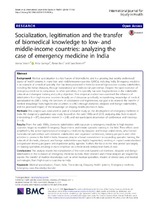Socialization, legitimation and the transfer of biomedical knowledge to low- and middle-income countries: analyzing the case of emergency medicine in India
Date
2018Author
Sriram, Veena
George, Asha S.
Baru, Rama
Bennett, Sara
Metadata
Show full item recordAbstract
BACKGROUND: Medical specialization is a key feature of biomedicine, and is a growing, but weakly understood
aspect of health systems in many low- and middle-income countries (LMICs), including India. Emergency medicine
is an example of a medical specialty that has been promoted in India by several high-income country stakeholders,
including the Indian diaspora, through transnational and institutional partnerships. Despite the rapid evolution of
emergency medicine in comparison to other specialties, this specialty has seen fragmentation in the stakeholder
network and divergent training and policy objectives. Few empirical studies have examined the influence of
stakeholders from high-income countries broadly, or of diasporas specifically, in transferring knowledge of medical
specialization to LMICs. Using the concepts of socialization and legitimation, our goal is to examine the transfer of
medical knowledge from high-income countries to LMICs through domestic, diasporic and foreign stakeholders,
and the perceived impact of this knowledge on shaping health priorities in India.
METHODS: This analysis was conducted as part of a broader study on the development of emergency medicine in
India. We designed a qualitative case study focused on the early 1990s until 2015, analyzing data from in-depth
interviewing (n = 87), document review (n = 248), and non-participant observation of conferences and meetings
(n = 6).
RESULTS: From the early 1990s, domestic stakeholders with exposure to emergency medicine in high-income
countries began to establish Emergency Departments and initiate specialist training in the field. Their efforts were
amplified by the active legitimation of emergency medicine by diasporic and foreign stakeholders, who formed
transnational partnerships with domestic stakeholders and organized conferences, training programs and other
activities to promote the field in India. However, despite a broad commitment to expanding specialist training, the
network of domestic, diasporic and foreign stakeholders was highly fragmented, resulting in myriad unstandardized
postgraduate training programs and duplicative policy agendas. Further, the focus in this time period was largely
on training specialists, resulting in more emphasis on a medicalized, tertiary-level form of care.
CONCLUSIONS: This analysis reveals the complexities of the roles and dynamics of domestic, diasporic and foreign
stakeholders in the evolution of emergency medicine in India. More research and critical analyses are required to
explore the transfer of medical knowledge, such as other medical specialties, models of clinical care, and medical
technologies, from high-income countries to India.

